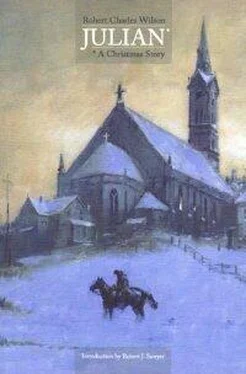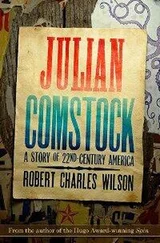“Of course, they did it better in the secular era,” Julian whispered, and I prayed no one had overheard this indelicate comment. By all reports, movies had indeed been spectacular during the Efflorescence of Oil—with recorded sound, natural color rather than black-and-gray, etc. But they were also (by the same reports) hideously impious, blasphemous to the extreme, and routinely pornographic. Fortunately (or unfortunately , from Julian’s point of view) no examples have survived; the media on which they were recorded was ephemeral; the film stock has long since rotted, and “digital” copies are degraded and wholly undecodable. These movies belonged to the twentieth and early twenty-first centuries—that period of great, unsustainable, and hedonistic prosperity, driven by the burning of Earth’s reserves of perishable oil, which culminated in the False Tribulation, and the wars, and the plagues, and the painful dwindling of inflated populations to more reasonable numbers.
Our truest and best American antiquity, as the Dominion History of the Union insisted, was the nineteenth century, whose household virtues and modest industries we have been forced by circumstance to imperfectly restore, whose skills were practical, and whose literature was often useful and improving. But I have to confess that some of Julian’s apostasy had infected me. I was troubled by unhappy thoughts even as the torchieres were extinguished and Ben Kreel (our Dominion representative, standing in front of the movie screen) delivered a brief lecture on Nation, Piety, and Duty. War , Julian had said, implying not just the everlasting War in Labrador but a new phase of it, one that might reach its skeletal hand right into Williams Ford—and then what of me, and what of my family?
“We are here to cast our ballots,” Ben Kreel said in summation, “a sacred duty at once to our country and our faith, a country so successfully and benevolently stewarded by its leader, President Deklan Comstock, whose Campaigners, I see by the motions of their hands, are anxious to get on with the events of the night; and so, without further adieu, etc., please direct your attention to the presentation of their moving picture, First Under Heaven , which they have prepared for our enjoyment—” The necessary gear had been hauled into Williams Ford under a canvas-top wagon: a projection apparatus and a portable Swiss dynamo (probably captured from the Dutch forces in Labrador), powered by distilled spirits, installed in a sort of trench or redoubt freshly dug behind the church to muffle its sound, which nevertheless penetrated through the plank floors like the growl of a huge dog. This vibration only added to the sense of moment, as the last illuminating flame was extinguished and the electric bulb within the huge black mechanical projector flared up.
The movie began. As it was the first I had ever seen, my astonishment was complete. I was so entranced by the illusion of photographs “come to life” that the substance of the scenes almost escaped me… but I remember an ornate title, and scenes of the Second Battle of Quebec, recreated by actors but utterly real to me, accompanied by drum-banging and shrill penny whistling to represent the reports of shot and shell. Those at the front of the auditorium flinched instinctively; several of the village’s prominent women came near to fainting, and clasped the hands or arms of their male companions, who might be as bruised, come morning, as if they had participated in the battle itself. Soon enough, however, the Dutchmen under their cross-and-laurel flag began to retreat from the American forces, and an actor representing the young Deklan Comstock came to the fore, reciting his Vows of Inauguration (a bit prematurely, but history was here truncated for the purposes of art)—that’s the one in which he mentions both the Continental Imperative and the Debt to the Past. He was voiced, of course, by one of the players, a basso profundo whose tones emerged from his speaking-bell with ponderous gravity. (Which was also a slight revision of the truth, for the genuine Deklan Comstock possessed a high-pitched voice, and was prone to petulance.)
The movie then proceeded to more decorous episodes and scenic views representing the glories of the reign of Deklan Conqueror, as he was known to the Army of the Laurentians, which had marched him to his ascendancy in New York City. Here was the reconstruction of Washington, DC (a project never completed, always in progress, hindered by a swampy climate and insect-borne diseases); here was the Illumination of Manhattan, whereby electric streetlights were powered by a hydroelectric dynamo, four hours every day between 6 and 10 p.m.; here was the military shipyard at Boston Harbor, the coal mines and foundries and weapons factories of Pennsylvania, the newest and shiniest steam engines to pull the newest and shiniest trains, etc., etc.
I had to wonder at Julian’s reaction to all this. This entire show, after all, was concocted to extoll the virtues of the man who had contrived the death by hanging of his father. I could not forget—and Julian must be constantly aware—that the current President was a fratricidal tyrant. But Julian’s eyes were riveted on the screen. This reflected (I later learned) not his opinion of contemporary politics but his fascination with what he preferred to call “cinema.” This making of illusions in two dimensions was never far from his mind—it was, perhaps, his “true calling,” and would culminate in the creation of Julian’s suppressed cinematic masterwork, The Life and Adventures of the Great Naturalist Charles Darwin… but that tale remains for another telling.
The present movie went on to mention the successful forays against the Brazilians at Panama during Deklan Conqueror’s reign, which may have struck closer to home, for I saw Julian wince once or twice. As for me… I tried to lose myself in the moment, but my attention was woefully truant. Perhaps it was the strangeness of the campaign event, so close to Christmas. Perhaps it was the HISTORY OF MANKIND IN SPACE, which I had been reading in bed, a page or two at a time, almost every night since our journey to the Tip. Whatever the cause, I was beset by a sudden anxiety and sense of melancholy. Here I was in the midst of everything that seemed familiar and ought to be comforting—the crowd of the leasing class, the enclosing benevolence of the Dominion Hall, the banners and tokens of the Christmas season—and it all felt suddenly ephemeral , as if the world were a bucket from which the bottom had dropped out.
Perhaps this was what Julian had called “the philosopher’s perspective.” If so, I wondered how the philosophers endured it. I had learned a little from Sam Godwin—and more from Julian, who read books of which even Sam disapproved—about the discredited ideas of the Secular Era. I thought of Einstein, and his insistence that no particular point of view of was more privileged than any other: in other words his “general relativity,” and its claim that the answer to the question “What is real?” begins with the question “Where are you standing?” Was that all I was, here in the cocoon of Williams Ford—a Point of View? Or was I an incarnation of a molecule of DNA, “imperfectly remembering,” as Julian had said, an ape, a fish, and an amoeba?
Maybe even the Nation that Ben Kreel had praised so extravagantly was only an example of this trend in nature—an imperfect memory of another century, which had itself been an imperfect memory of all the centuries before it, and so back to the dawn of Man (in Eden, or Africa , as Julian believed). Perhaps this was just my growing disenchantment with the town where I had been raised—or a presentiment that it was about to be stolen away from me.
Читать дальше












